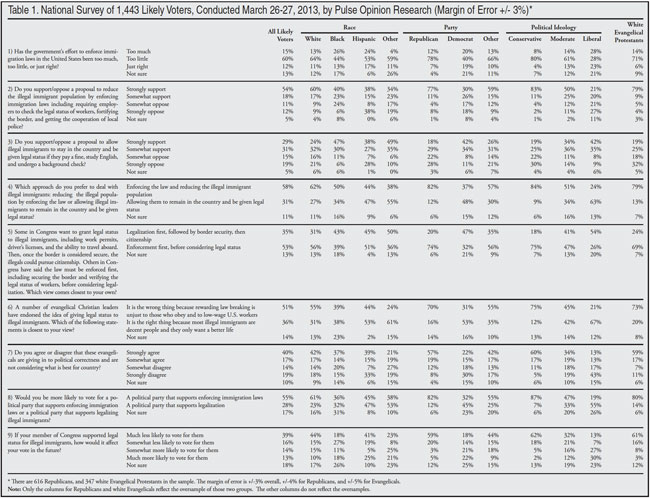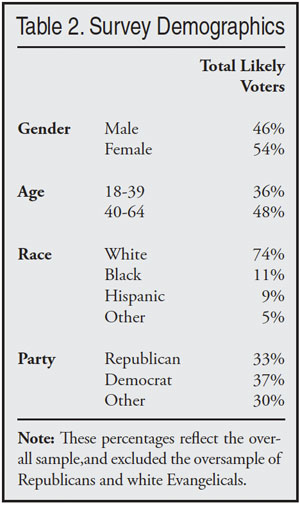Download a pdf of this Backgrounder
Steven A. Camarota is the Director of Research at the Center for Immigration Studies.

This Backgrounder reports the results of a new Pulse Opinion Research poll, which finds that most Americans want immigration laws enforced. When given a choice between reducing the illegal immigrant population by enforcing the law or a conditional legalization, the public strongly prefers enforcement. This is especially true of Republican voters.
GOP leaders who support legalization risk alienating not only the general public, but the overwhelming majority of their own party. We also find that a majority of voters and Republican voters in particular say they are less likely to vote for their member of Congress or a political party that supports legalization. Unlike many other polls, this poll uses neutral language and avoids the false choice of conditional legalization vs. mass deportation.
Overall Results
- Of likely voters, 72 percent said they support reducing the illegal immigrant population by requiring employers to check workers' legal status, fortifying the border, and getting the cooperation of local police. A total of 54 percent said they strongly support this approach.
- There is also support for legalizing illegal immigrants with 61 percent of likely voters indicating they support giving illegal immigrants legal status if they pay a fine, study English, and undergo a background check. Twenty-nine percent said they "strongly support" this approach.
- When we asked which of the two approaches they prefer, 58 percent of likely voters said they support reducing the illegal immigrant population through enforcement, while just 31 percent said they prefer legalization with the conditions listed above.
- Supporting legalization is politically risky. Of likely voters, 56 percent said they would be less likely to vote for a member of Congress who supported legalization, while just 27 percent said they would be more likely to vote for a member who supports legalization — a 29 percentage-point spread.
Republicans
- A sample of 616 likely Republican voters found that 88 percent said they support reducing the illegal immigrant population by requiring employers to check workers' legal status, fortifying the border, and getting the cooperation of local police. A total of 77 percent said they "strongly support" this approach.
- Of likely Republican voters, 47 percent said they support giving illegal immigrants legal status if they pay a fine, study English, and undergo a background check. Only 18 percent "strongly support" this approach.
- When we asked which of the two approaches they prefer, 82 percent of Republicans said they support reducing the illegal immigrant population, while just 12 percent said they support legalization with conditions.
- Supporting legalization is politically very risky for Republican politicians. Of likely Republican voters, 79 percent said they would be less likely to vote for their member of Congress who supported legalization, while just 8 percent of voters said they would be more likely to vote a member who supported legalization — a 71 percentage-point spread.
- A number of conservative evangelical leaders have endorsed the idea of legalizing illegal immigrants. However, among self-identified white evangelicals, enforcement is by far the most popular option: 79 percent said they preferred reducing the illegal immigrant population by enforcing the law vs. 13 percent who supported legalization with conditions.
Discussion
Designing a survey is never easy. But in recent months many survey companies and organizations have asked extremely one-sided immigration questions that simply do not reflect the position of those advocating enforcement. Our poll avoids this problem by asking questions that actually reflect the policy debate. We first asked the public whether they would like the law enforced and the illegal immigrant population reduced. We then asked if they would support a conditional legalization. Finally, we asked which approach they prefer. All survey questions can be found in the table at the end of the Backgrounder.
The questions asked avoid the false choice between deporting all illegal immigrants — which no political leader is advocating — and a conditional legalization. The survey uses neutral language, avoiding terms like "amnesty", "illegal alien", and "undocumented". The findings strongly indicate that enforcement is very popular with the public and the preferred way to deal with illegal immigration.
A good example of a problematic question was found in the exit poll from the 2012 presidential election conducted by Edison Research for U.S. television news networks and the Associated Press.1 The poll asked "Should most illegal immigrants working in the United States be: Offered a chance to apply for legal status or be deported to the country they came from." This question adds a condition of "working" on legalization and it also further skews the results by making the legalization sound reasonable by using the phase "be given a chance", while putting no such qualifiers on the enforcement option. Worse, the question itself did not represent the actual stated position of the Republican presidential candidate.
Governor Mitt Romney stated clearly during the second presidential debate that he was "not in favor of rounding up people". Yet this is what Edison Research asked. Romney made it clear that he wanted to enforce the law and encourage illegal immigrants to return home.2 But Edison Research entirely ignored the candidate's stated position and instead put in the position of deporting most illegal immigrants. It is not clear why Edison or the news outlets that contracted the company to conduct the poll did not ask a question that reflected Romney's position.
A recent poll by the Brookings Institution is also problematic in that it used biased language, asking voters to choose between these options: "secure our borders and arrest and deport all those who are here illegally" or "both secure our borders and provide an earned path to citizenship for illegal immigrants already in the U.S."3 Again, the question presents the choice between "earned" citizenship versus "deport all". Since no major politician or pro-enforcement group is advocating deporting all illegal immigrants, it is very odd that Brookings chose this wording. But the biased nature of the poll makes the results largely meaningless.
What the presidential exit poll and the Brookings poll do demonstrate is that in general the public does not want mass deportations. But the new Pulse Opinion Research poll shows that, if given the choice between conditional legalization vs. enforcing the law and reducing the illegal immigration population, enforcement is the overwhelming choice of the American people.
This is the most meaningful measure of public sentiment with regard to enforcement because this is the approach that is actually being advocated by supporters of enforcement. Enforcement advocates in and out of Congress want to reduce the illegal immigrant population by enforcing the law, including requiring employers to verify the legal status of workers, controlling the border, and getting the cooperation of local police departments. This is the question that should be asked of voters.
By asking questions that actually reflect the real policy choices being debated in Congress, and avoiding the biased questions of so many polls, the Pulse Opinion Research poll reported here provides a much clearer and more accurate picture of what the American people want on immigration. It shows that while there is certainly some support for legalization and citizenship, most Americans want the law enforced and illegal immigrants to return to their home countries. One may disagree with the idea of enforcement. But if pollsters are to provide an accurate picture of what the public thinks, they must ask questions that reflect the policy debate. It is our hope that this poll will help to correct this situation by demonstrating a more reasonable way of asking questions about illegal immigration.
The poll was conducted by Pulse Opinion Research and is a national survey of 1,443 likely voters conducted March 26-27, 2013, with a margin of error of +/-3% overall and +/-4% for Republicans. Question wording is provided in the table.


End Notes
1 Edison Research's announcement of their 2012 exit poll can be found here. The wording of Edison's poll can be found here.
2 See transcript of second presidential debate.
3 See p. 53 of the Brookings report.
